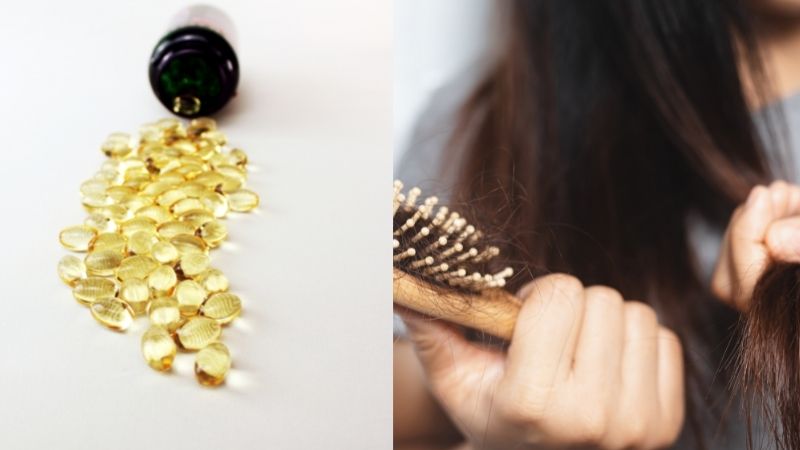Can vitamin D deficiency cause hair loss for real?
Have you been experiencing hair fall lately? If yes, then what could be the reason behind it?
Pollution, bad hair care, stress, or lack of vitamins?
While all of the aforementioned causes can lead to hair loss and thinning, deficiency of vitamins, particularly vitamin D, is the primary culprit behind severe hair loss.
Yes, you read that right.
Vitamin D is an essential nutrient for overall health. It not only boosts immunity, promotes bones and skin health, stimulates cell growth, but also aids in the regrowth of hair.
Henceforth, deficiency of the sunshine vitamin AKA vitamin D can affect your hair health.
Having said that, let’s find out how low vitamin D and hair loss are linked.
How Does Vitamin D Deficiency Cause Hair Loss and Thinning?

According to various research, vitamin D deficiency can cause hair loss.
In fact, the studies have suggested that vitamin D deficiency is linked to auto-immune disorder Alopecia – a condition in which a person loses hair in patches.
Adding to this, vitamin D deficiency is one of the causes of diffuse hair loss which happens because of a disturbed hair growth cycle.
As a result, a person dealing with vitamin D deficiency has hair follicles that have trouble regulating hair re-growth.
Moreover, a lack of vitamin D can cause hair loss in both men and women.
In fact, low vitamin D can cause hair loss more in women than men.
In a case-controlled study, 45 women with Female Pattern Hair Loss were compared with the same number of healthy women matched with the same age, BMI, and hours spent in sunlight. ELISA was used to measure serum 25(OH) D3 level.
It was concluded in the study that serum vitamin D3 levels in patients were 13.45 and control groups were 17.16 respectively.
Furthermore, the study indicated the relation between Female Pattern Hair Loss and decreased serum levels of vitamin D3.
Now that you know how vitamin D deficiency causes hair loss, let’s see what effects it has on your hair.
Effects Of Vitamin D On Hair

Vitamin D can affect the whole life cycle of your hair in 3 stages.
#1. Active Growth Phase – In this, vitamin D receptors detach nearby skin cells to produce new hair fibers.
#2. Short Transitional Phase – In this 10-20 days of the hair growth cycle, Vitamin D hair regrowth kick starts.
#3. Resting Phase – This resting period of hair lasts for 100 days. Only after this phase, hair starts to re-grow.
And considering the above points, we can infer:
- Vitamin D does stop hair falling out and regulates hair growth.
- VDR (Vitamin D Receptors) are vital for maintaining the long life of hair.
- Vitamin D is also responsible for keratin production.
This was all about how vitamin D affects hair regrowth. Now that we have already discussed how can lack of vitamin D cause hair loss and thinning, let’s find out how can you reduce hair fall caused by vitamin D deficiency.
How to Stop Hair Loss from Vitamin D Deficiency? [3 Ways]

Vitamin D is one of the best vitamins for hair loss.
So, in case you are dealing with a lack of vitamin D, these are the top 3 ways to recover from it to treat hair loss.
#1. Vitamin D Supplements
Taking vitamin D supplements is the best way to recover from vitamin D deficiency quickly.
To elaborate, you must make a regular visit to your doctor to evaluate the level of vitamin D.
After that, consume the recommended vitamin D supplements for faster recovery.
The recommended dosage of vitamin D for different age groups is:
- Age 19-55 years – 600 IU of Vitamin D daily
- Above 55 years – Between 600-800 IU of Vitamin D daily
- Children – 400-600 IU of Vitamin D
#2. Vitamin D Foods
By making simple dietary changes, your body can restore the vitamin D level and recover from the hair loss issue.
A lack of vitamin D can also be corrected by consuming foods rich in vitamin D.
Here are some great food sources of vitamin D:
- Avocados
- Chia Seeds
- Mushrooms
- Almond Milk
- Soy Milk
- Tofu
- Oranges
- Legumes and Nuts
- Liver
- Red Meat
- Fatty fish such as sardines
#3. A Good Dose Of Sunshine
If you’re one of those people who stay inside, there are high chances that the various scalp and hair-fall-related issues you’re dealing with are because of it.
At every age, a good dose of sunshine is essential to maintain a balance of vitamin D levels.
When exposed to sunlight, the skin works to synthesize vitamin D.
When absorbed from UV lights, vitamin D2 naturally converts into vitamin D3 (this form of vitamin D is used by the body).
However, it is important to keep in mind the right way to sunbathe to avoid sunburn.
- It’s recommended to sunbathe between 11 am-1 pm.
- For adequate vitamin D level, 13 minutes of fully clothed sun exposure 3 times a day is enough.
Moreover, in case you are still not completely recovered from vitamin D deficiency, you might want to consider topical and oral hair loss treatments.
Prevention Measures For Hair Breakage
Brittle hair requires extra care and gentle treatment. Hence, if you’re experiencing abnormal hair fall, take the following measures:
- Avoid tying your hair into tight ponytails.
- Don’t pull your hair by brushing.
- Do regular scalp oiling to provide moisture and better blood circulation.
- Use a mild conditioner.
- Tie your hair into a loose braid before bed to avoid tangling.
While Vitamin D deficiency does cause hair loss, luckily you can even prevent it by taking certain precautions and making some simple yet effective dietary and lifestyle changes.
Final Takeaway
Hair loss is common, and there could be infinite reasons behind it.
And while people primarily go for oiling, spa, and hair cut, they fail to consider dietary changes to get over this deficiency.
Of course, a lack of vitamin D can cause hair loss. In a similar manner, vitamin D can also stop hair fall out.
Vitamin D benefits for hair include:
- Generation of new hair follicles.
- Stops hair loss and prevents baldness.
- Can reverse the effects of alopecia.
- Prevent premature graying of hair.
- Stimulates hair re-growth and stops existing hair from falling out.
Although hair fall because of a lack of vitamin D is common, it can be treated with proper supplementation, dietary changes, and a few minutes of careful sun exposure.
Cut And Dry can not always be the solution.
Hope you’ve found this blog informative. Do let us know your thoughts in the comments section right below.
ALSO READ:
Does Biotin Help Hair Growth | Benefits, Side Effects & Dosage